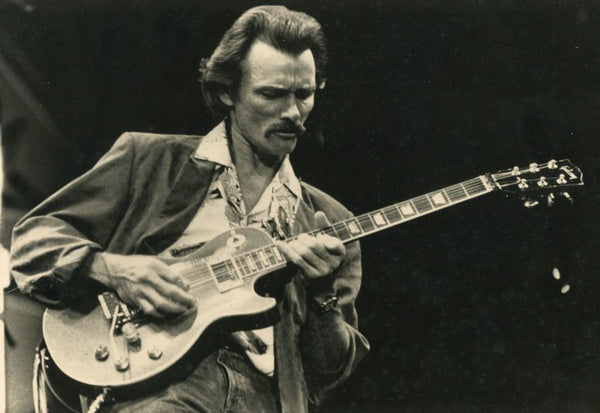Dickey Betts, the guitar-slinging giant of Southern Rock and one half of the lead guitar axis (along with the late Duane Allman) of the richly-storied Allman Brothers Band, is the sole survivor of the front line of that truly legendary combo. Indeed, as Duane Allman once quoted, “I’m the famous guitarist, but Dickey’s the good one”. The matching of Allman’s blues-soaked licks to Betts’ cultured, Jazz-inflected style – although the pair only worked together for three years – set an improvisational standard that was not only hugely influential, but has (arguably) never been bettered in the rock and roll pantheon in the last four decades.
The untimely death of Duane Allman on 29th October 1971 saw Betts having to handle the slide guitar parts and the lead line – an unenviable task, and one on which he did not stint. That he ended up composing such classic tracks as ‘Ramblin’ Man’ and ‘Jessica’ for the bands’ brilliant Brothers and Sisters album of 1973, and opened up a vibrant new chapter in the band’s career is testament to the man’s creativity and musical talent.
The internecine strife and debilitating drug issues that plagued the ABB as the seventies wore on proved too much, and Betts convened a new backing crew, Great Southern, in 1977, after the ABB finally imploded (for the time being at least) in 1976. The Great Southern line-up comprised Dickey Betts (slide guitar, electric and acoustic guitars, vocals), Dan Toler (electric and acoustic guitars, vocals), Tom Broome (keyboards, vocals), Ken Tibbetts (bass), Jerry Thompson (drums, percussion) and Doni Sharbono (drums, percussion).
Betts sought not to offer up a carbon copy of the Allmans, but something that would push his personal musical envelope a little further out there, and stand or fall on his own. Although The Blues was still a potent musical strand in their sound, it was Country that arguably held the greater influential sway.
The band released an album Dickey Betts & Great Southern which did pretty well, sales-wise, in the USA, peaking at number thirty-one in the Billboard Album chart listings in April, 1977, and hanging around in the charts for twelve weeks. But the whole ‘Southern Rock’ milieu was, in large part, running out of steam; a few months after the release of Great Southern, one of the biggest of the Southern Rock bands, Lynyrd Skynyrd, were the victims of a terrible tragedy, losing singer Ronnie Van Zandt, guitarist Steve Gaines and backing vocalist Cassie Gaines in a plane crash, whilst other members of the band suffered horrendous injuries, resulting in their enforced disbanding.
Music was showing signs of moving on, into New Wave and other genres. The follow up album Atlanta’s Burning Down was released a year later by but it failed to match the debut, peaking at a relatively lowly one hundred and fifty-seven in the Billboard album charts in April 1978.
The times were most definitely changing by then and besides there was the offer of a reconciliation with the Allmans. Betts was also experiencing personal issues that would keep him from making music under his own name for nearly a decade. Great Southern may have been a slight diversion, a fork in the road, maybe, in Betts’ lengthy career, but it was certainly an entertaining one, making music of lasting value and high quality.
With thanks to Alan Robinson
